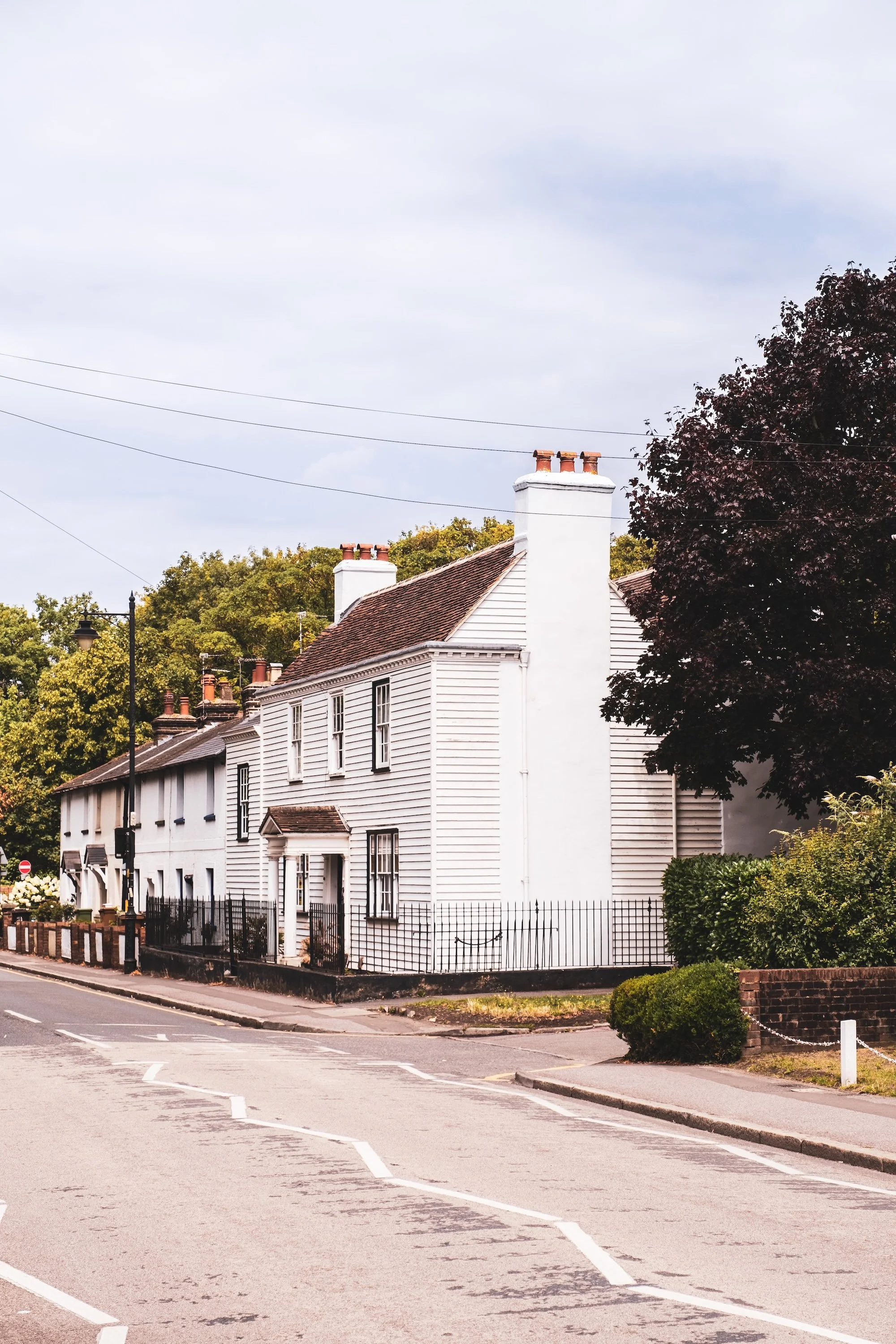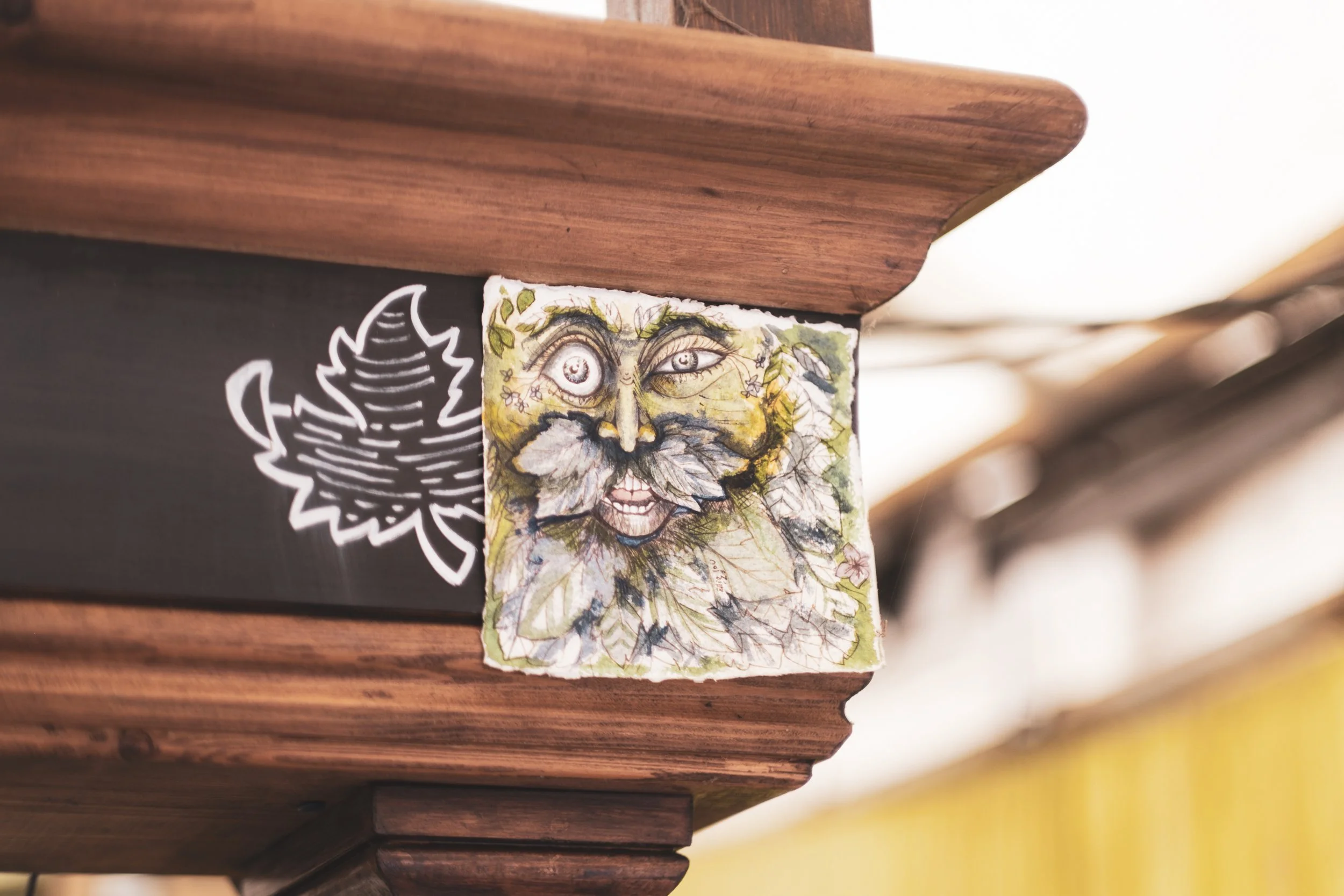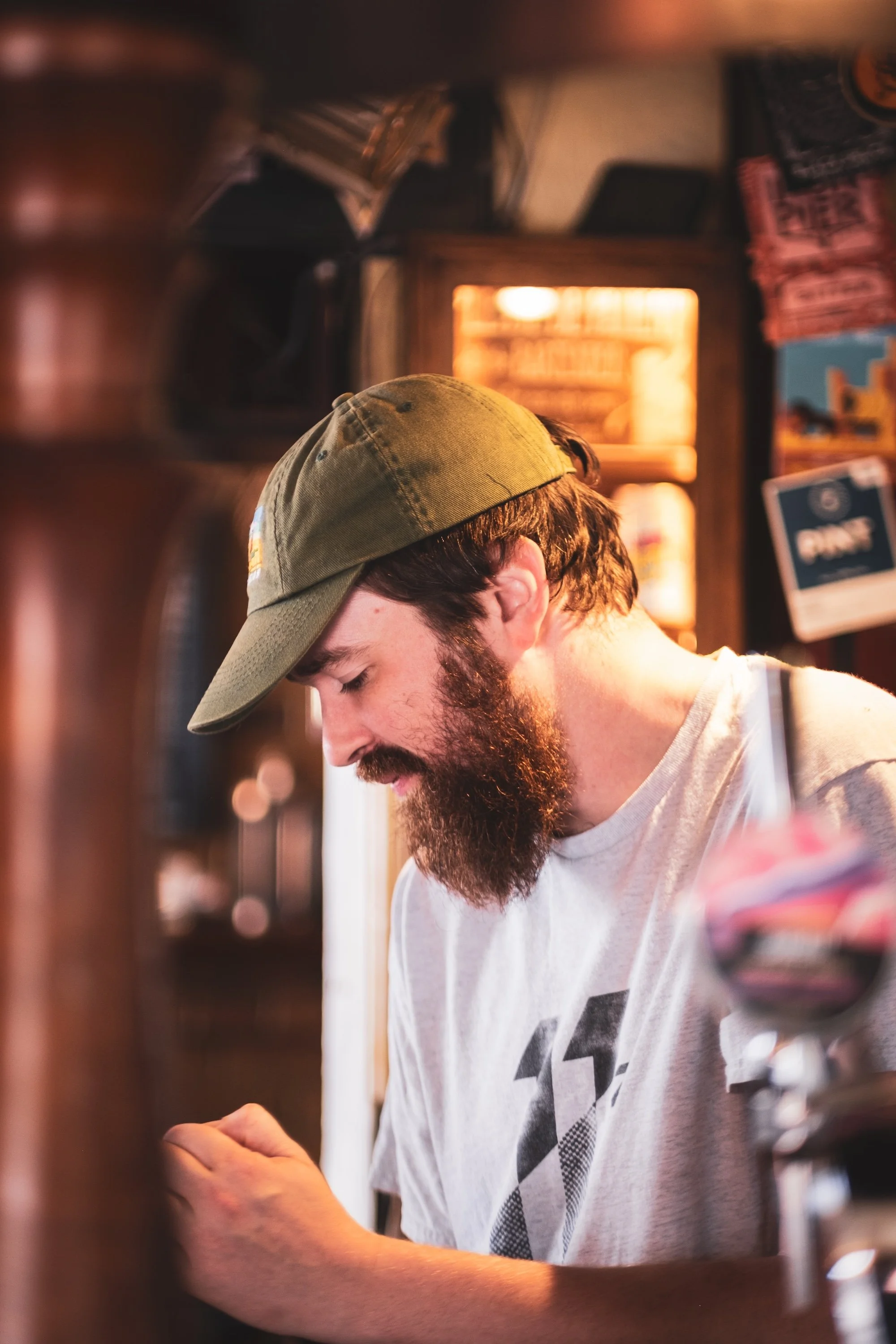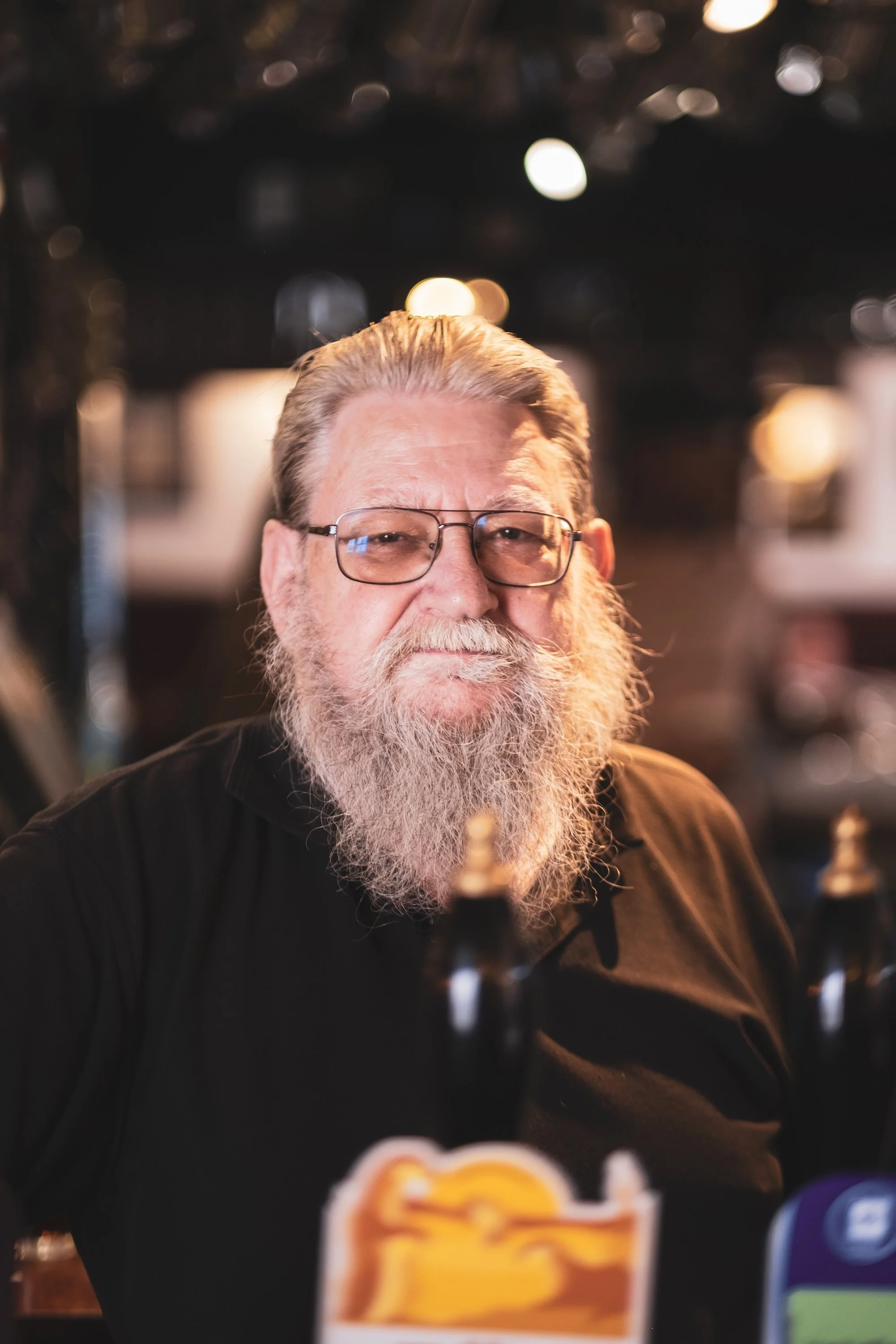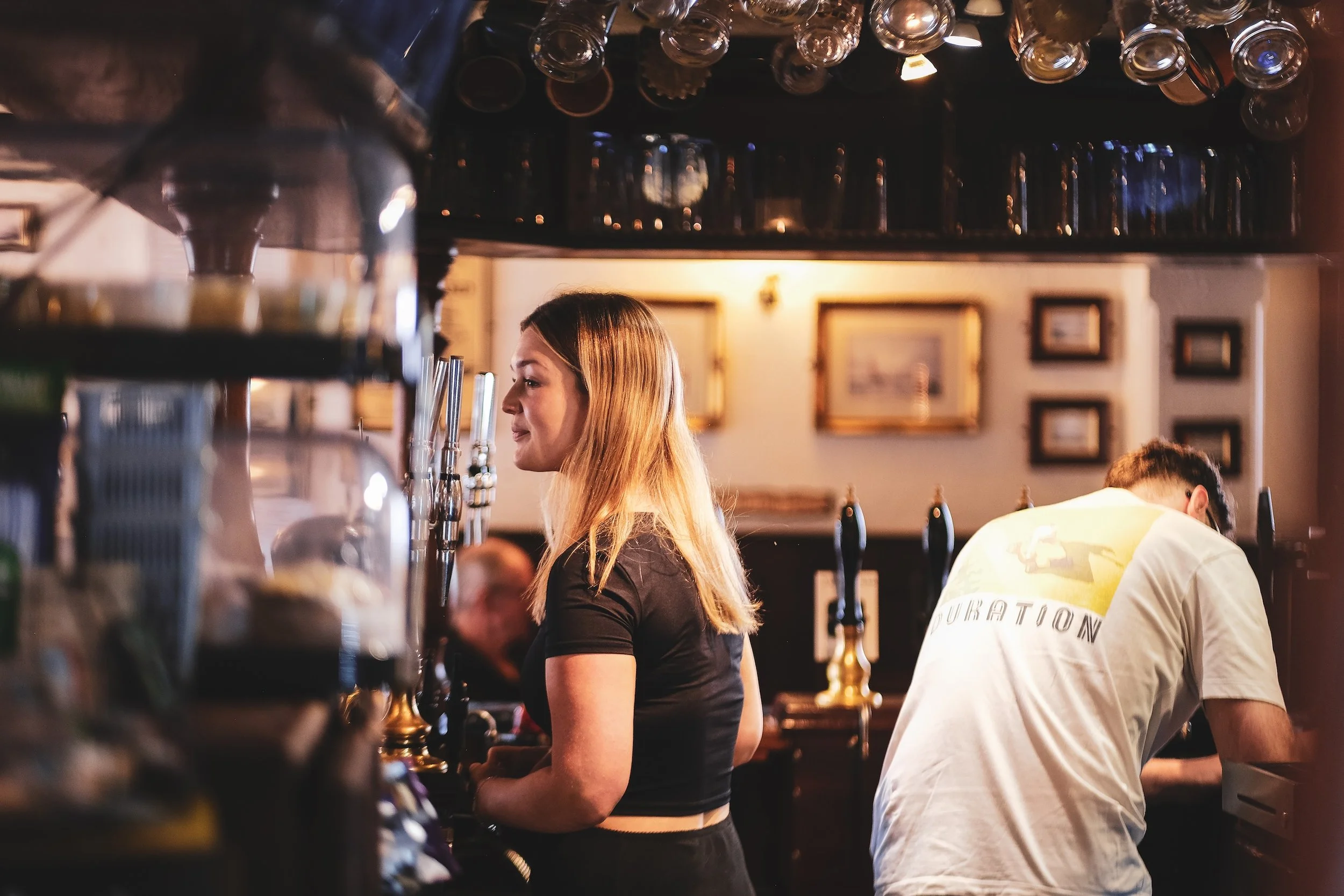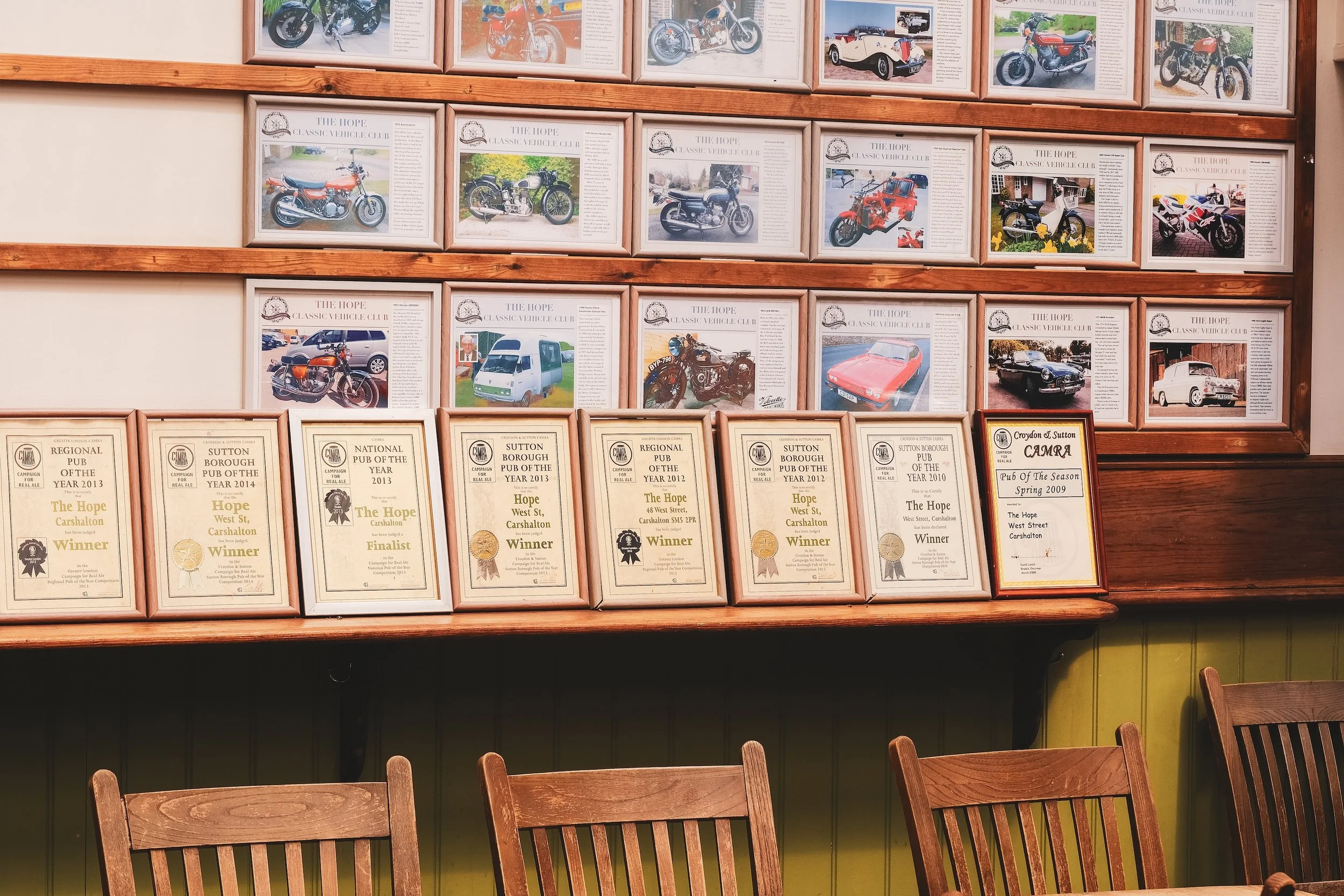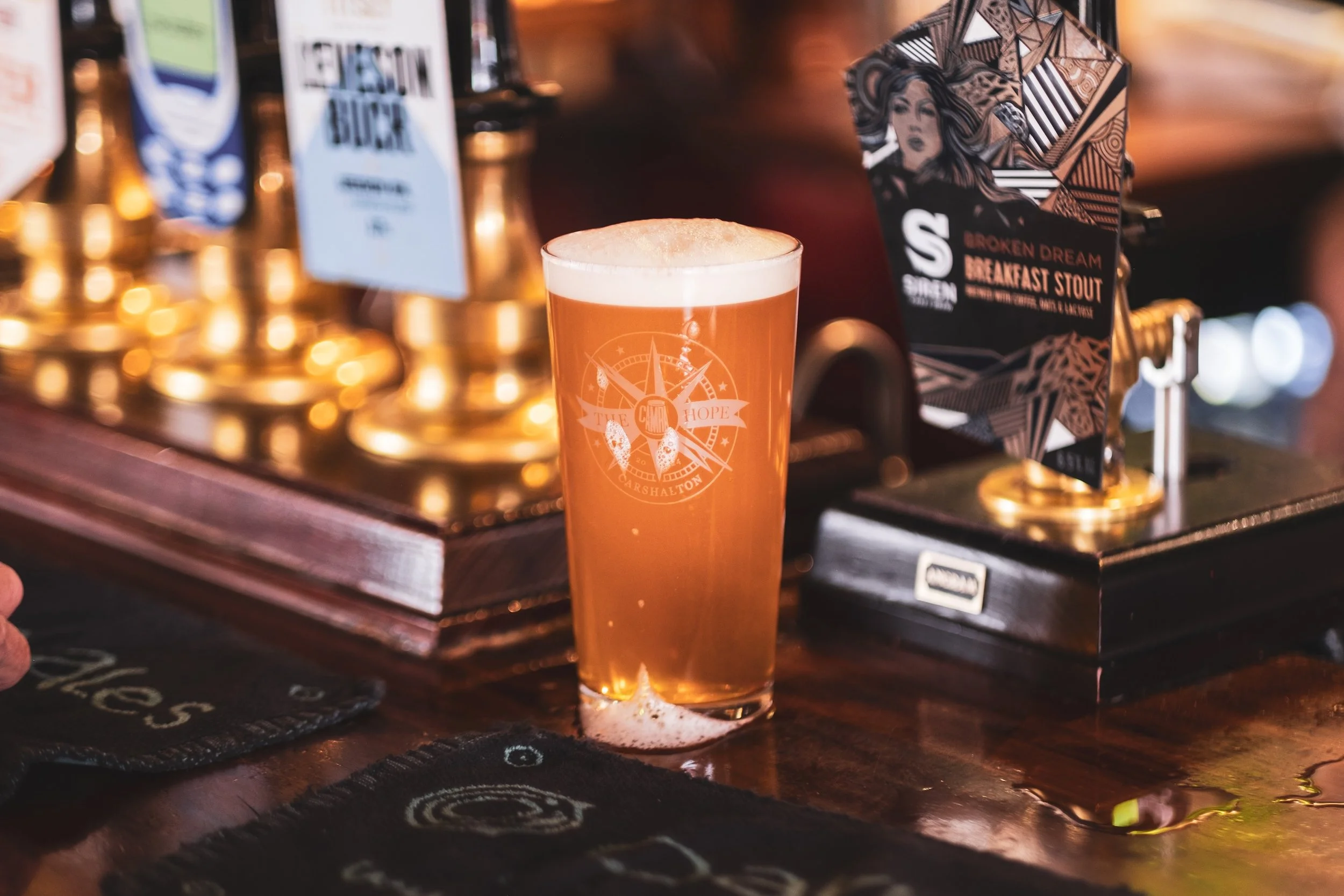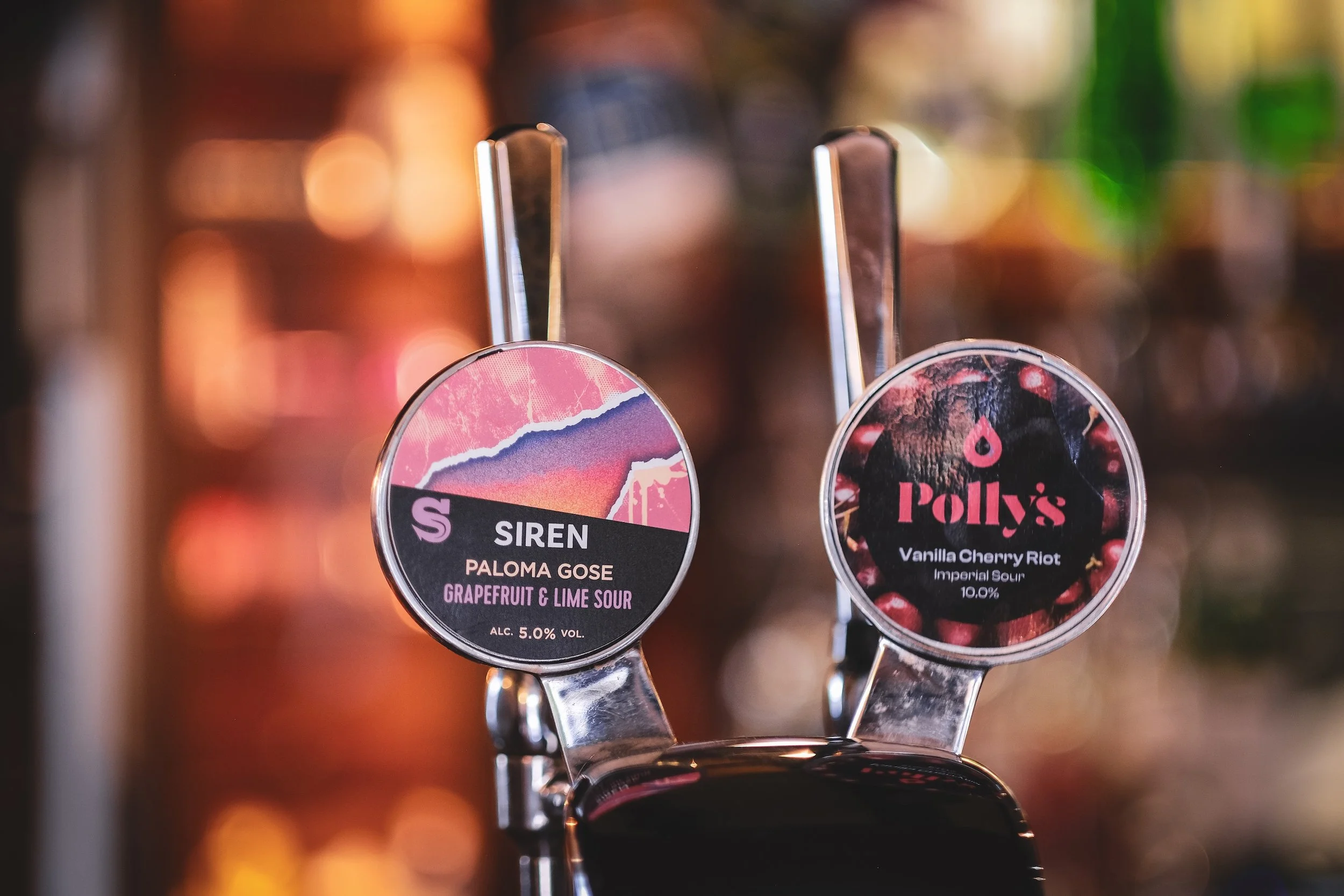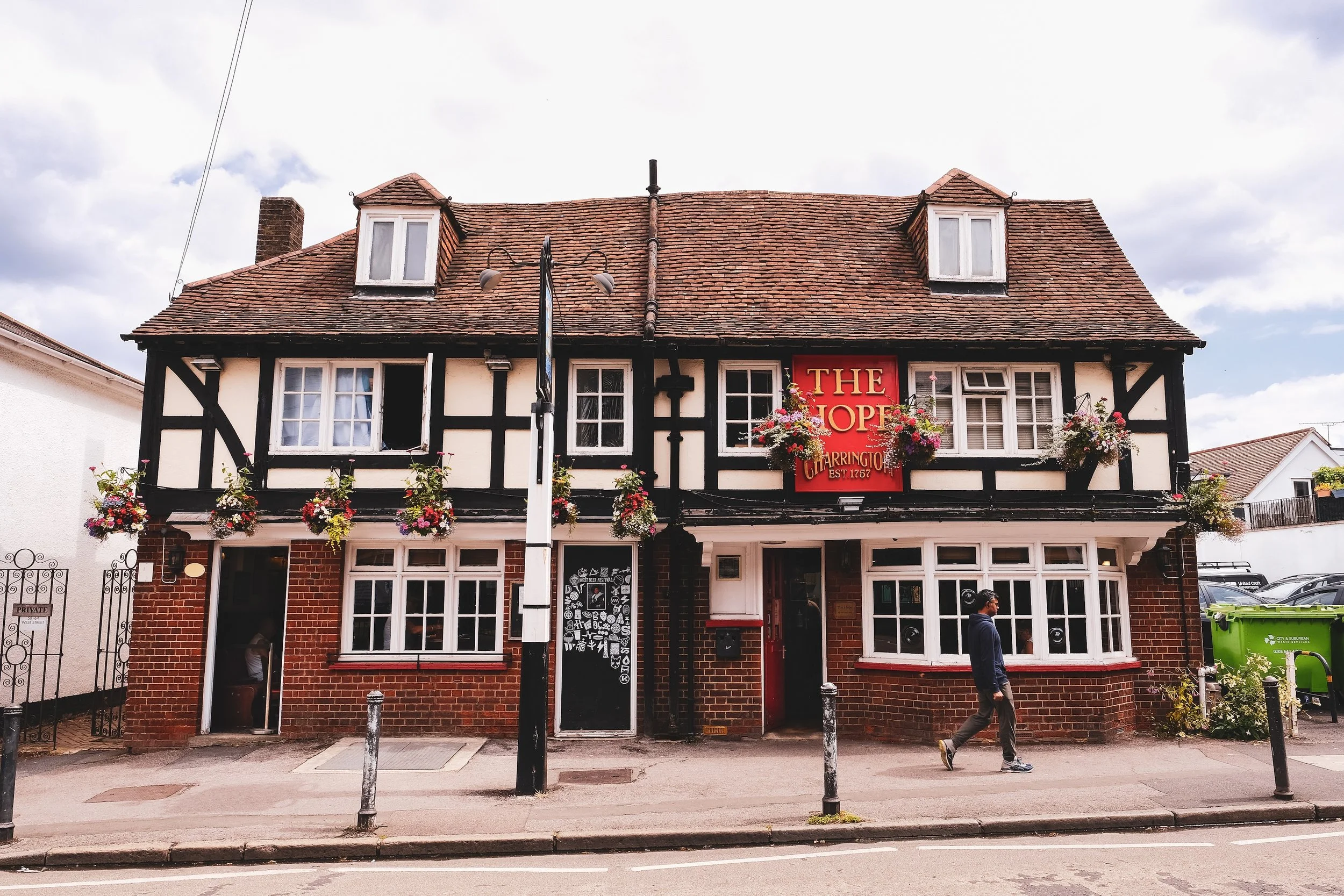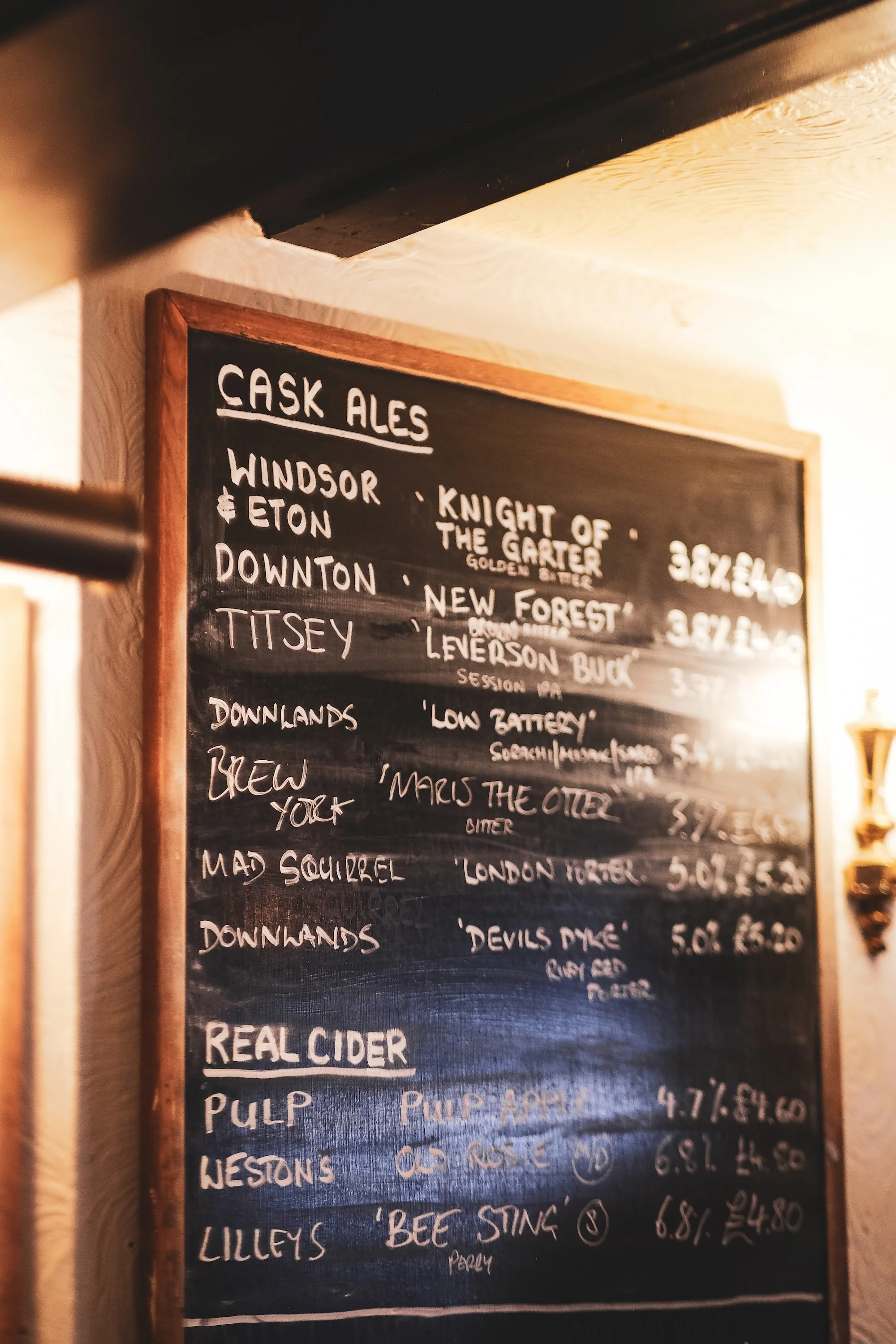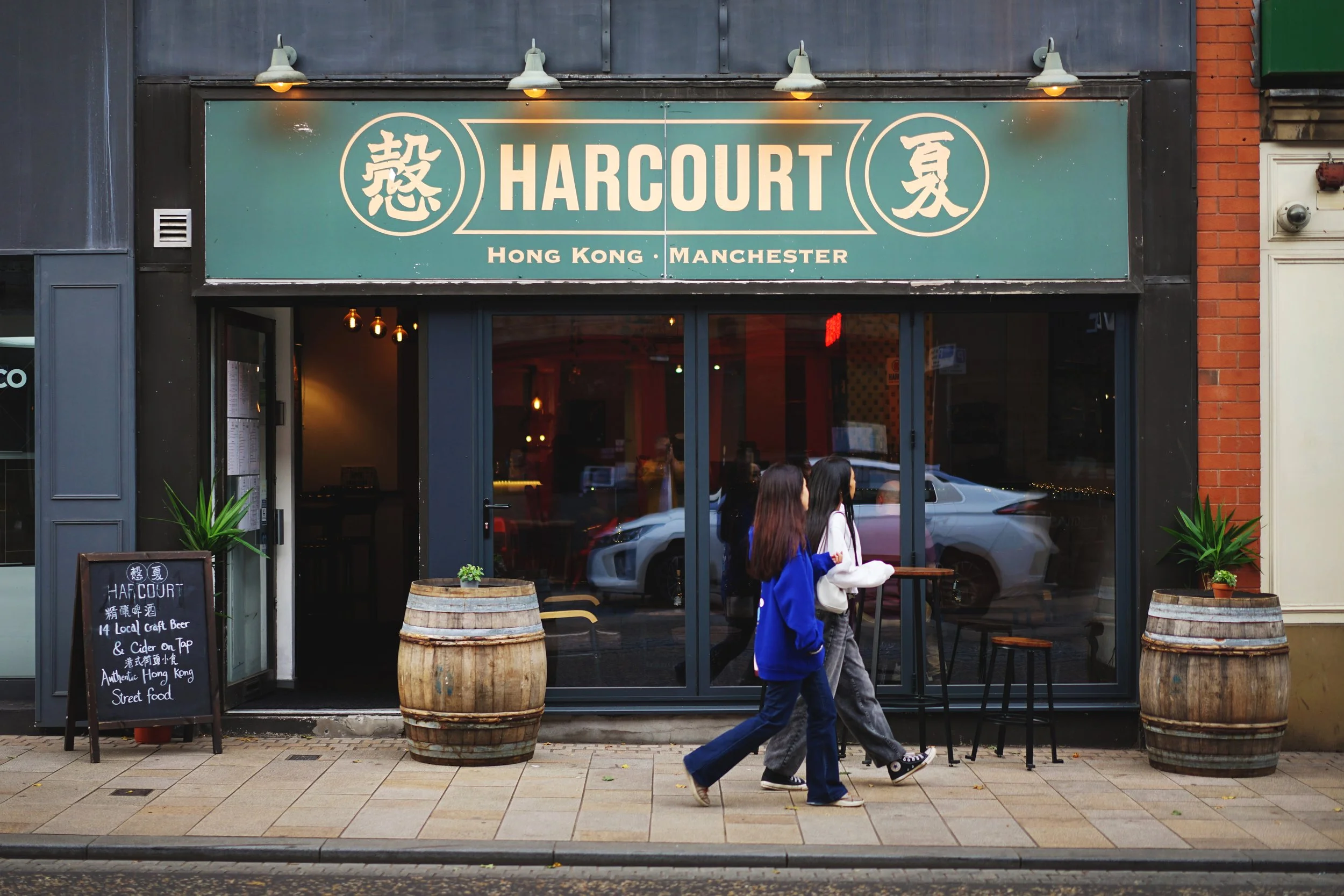The Best Days of our Lives — The Hope, Carshalton
It’s at least 20 minutes before opening time and a queue has already formed outside The Hope. Although an occasional red London bus zooms past, this isn’t a bustling high street. Here, at the Sutton/Surrey borders, is one of the sleepiest corners of the capital, where daffodils, scorched in the sun, droop lazily as spring turns to summer.
I take a walk to avoid waiting around in the queue. On a nearby wall someone has scrawled: ‘No to ULEZ’ despite Carshalton’s traffic congestion encircling its Saxon-era ponds like an amorphous, metallic city wall. Despite the traffic, I suspect this town is a sleepy, commuter belt—a leafy nowhere, where nothing much happens—a similar type of semi-rural place to the one I had the misfortune to grow up in.
Photography by Lily Waite-Marsden
When patient punters are finally welcomed in at midday, I grab a seat while I can, order lunch, and gaze at the portholes above the bar, home to some faded paintings of tall ships. A bell rings. A plate is fetched. Scampi. Sachets of sauce. Sizzling chips.
The Hope reminds me of the nautical-themed seaside pubs of my childhood in coastal Essex or Kent, but without the stares of locals seeing a family of colour and making us feel othered.
My first visit was during its Dark Beer Fest in 2021, where I was among the 92 people who were there when it opened, aiming to beat the hundreds more who would arrive later. I found the locals to be welcoming, and after some light conversation I enjoyed the fact they seemed to share my left-leaning, anti-establishment views. Within the wooden beams there was an atmosphere that felt folky, despite the only background noise being ambient chatter and a sense of bucolic reverence.
It was one of the few times I felt I belonged at a beer festival and, while gazing at a sign advertising the pub's Strawjack harvest celebration, I wondered if Paganism was part of this inclusivity. A strange thought considering the way I connected this sort of event to horror films like the Wicker Man.
Here at The Hope, Paganism seems to be about indulgence—once a month 15 to 20 people get together and drink mead—and one of the many communities that call the pub their home.
“The Hope is more bohemian than Pagan,” says local artist and pub regular Neal Vaughan. “It’s a place where a lot of artists, musicians and people of alternative thinking congregate.”
***
The unusual way the Hope is run—community owned, with staff and community shareholders overseen by empowered leaders—is why it's gained a diverse clientele.
It’s also easy to see why people fall hard for it at first sight. That same pang was once felt by Nick Williams, who manages the pub day-to-day with colleague Mark Cotton. Nick knew The Hope from his childhood when it served a traditional line-up of beers. But one day in 2010, when he returned home from university, he poked his head in to discover it had transformed, now featuring what he felt was a similar vibe to the Evening Star in Brighton, where he had been previously pulling pints.
He ordered a pint, noticed they were short-staffed, asked to help, and has worked here ever since.
Supervising Nick and Mark is Rodger Molyneux. He acts as custodian after saving the pub from closure in 2009, when former owners, pubco giant Punch Taverns, were going to sell it off to an Indian restaurant chain, which would’ve meant its days as a drinking den were numbered. He was one of the Hope’s locals, having moved to Carshalton in 1988 to give his young family a better life.
Being involved with The Hope—and pub trade in general—for a long time doesn’t mean Rodger deals solely with financial matters, and he will help Nick and Mark manage hateful or anti-inclusionary behaviour.
““There’s a very strong sense of community so I quickly made friends when I moved here.””
“I take [unruly customers] to the car park and if they’re a similar age to me I say: ‘This isn’t on. The world has changed’,” Rodger tells me.
If you think this is over-policing, then everyone who walks through the doors gets a chance, and staff are trained not to judge anyone by the way they look when they enter the pub. This means The Hope team ensures that any unconscious bias or prejudice isn’t acted upon by ensuring people are always treated the same.
And that goes for shareholders too. In fact, Nick says he has permanently barred one shareholder from the pub who acted inappropriately to staff members.
“If Nick has anything he’s intolerant to—and it sounds like a paradox—it’s intolerance,” says Hope regular, teacher and musician John Donnelly, who moved to Carshalton after visiting the pub once.
“This makes it modern, forward-thinking and progressive. And there’s a very strong sense of community so I quickly made friends when I moved here.”
***
Artist Neal Vaughan believes my snap judgment about Carshalton being a bit of a sleepy backwater is wrong. He explains how it’s a hub of creativity, which the Hope is at the centre of. Citing a memory from 2016, Neal recalls when Rodger encouraged him to set up Carshalton Artists’ Open Studios with all meetings and post-event drinks held in the pub.
Tuesdays are described as a sacred weekday at the pub by Neal. It’s when folk musicians play an open session, board-game enthusiasts battle against each other at Scrabble, chess and Magic: The Gathering, and on occasion a leather maker taps away while seated on a chair. The pub even has a sailing crew that charters yachts, and when I visit they’re off for 10 days in the Adriatic.
“It reminds me of what was happening in Soho in the 50s and 60s,” Neal says. “It’s like Francis Bacon and his mates going to the Bathhouse [on Dean Street] and places like that—where artists feel safe and can chat.”
Rodger tells how he created a mission statement to make sure the pub retains his singular philosophy of ensuring the pricing of food and drink stays reasonable, the decor retains its traditional feel, and community events are held regularly.
He and Nick believe winning awards from the likes of CAMRA comes from naturally doing what their members like, rather than actively courting them. They refuse to offer members discounts believing that forcing customers to pay different amounts for pints is both insulting and anti-inclusionary.
“[But winning awards] shows we haven’t drifted from our mission statement,” Rodger says.
““Because times have been so hard, a lot of the fun has disappeared from the industry.””
This policy also bans televisions and radios in the pub, which might lead some to think it’s a folk music pub specifically, but the sectioned areas mean customers have the option to slink off to somewhere quieter, if they wish.
It’s easy to imagine that Rodger might struggle with the responsibilities of managing 56 staff members across multiple sites. As well as The Hope, he saved the nearby Charles Cryer Theatre six years ago, which now has a bar supporting local and independently-owned breweries—rare for multi-purpose venues not marketed exclusively at drinkers. He also remains custodian at The Trafalgar in Wimbledon, which he recently spent a lot of time keeping open after the property owner wanted to sell the building.
Saving community concerns and overhauling decaying pubs is in his DNA. It started in 1963, when Rodger’s uncle got him to help at a venue he owned. He’s also transformed the likes of the Dog & Bell in Deptford, South London, adapting it into a modern pub during the days when dock workers would still drink there. The key, he says, is how he’s learned to delegate roles to make sure his business acumen and organising skills are harnessed.
“If somebody is not better at being behind the bar than me, then I shouldn’t be employing them,” Rodger says.
***
One of the most important facets of the two pubs and the theatre Rodger oversees is the beer, and at The Hope he empowers Nick to handle the ordering. In his spare moments, Nick is a football fan and uses the travel involved to source beers from all over the country. “Thank goodness for Sutton United,” Rodger jokes.
But, thankfully, Nick doesn’t ignore what’s being brewed nearby and champions beer from Surrey—often rare to find outside their home county, even where I live 10 miles away in Lewisham. Take the beautiful-looking pale pint of Surrey Hills Brewery’s Shere Drop I enjoyed during my visit. Not only was it offering grapefruit and lemon aromas, but the malt and bitterness were so well balanced it felt as though each sip offered new subtle tropical flavours, along with a gentle, dry finish.
It demonstrates how there really is something for everyone here. I had this pub down as a dark ale specialist after my first visit those years ago, as they always have two on cask and a strong dark on keg. This often includes an imperial stout, served in halves or thirds. “Something sweet, heavy and in your face,” Nick says.
In fact, dark beers have become so synonymous with the Hope that they’re adding a line that will allow them to dispense independently produced nitro stouts and porters, such as Anspach & Hobday’s London Black and The Kernel’s Nitro Stout.
They try to not include beer that customers might find at the nearest Wetherspoons—they’ll buy anything but Jaipur from Thornbridge, for example, which is being sold by the pub chain for £3.29 a pint in Surrey. But they will occasionally stock beers, such as Sierra Nevada IPA, which you might find in supermarkets but less so at a pub.
And rather than having set margins, Nick will use the profits on certain beers to bring down the price of rarer kegs that people may never have tasted, so that the pub’s £8 a pint barrier isn’t broken.
“ “It’s a place where a lot of artists, musicians and people of alternative thinking congregate.””
They also pay the majority of their suppliers upfront, which gains goodwill in the trade and means they avoid the “horrible loop,” according to Nick, of having to sell a beer in 30 days to pay an invoice. In fact, when breweries face hardship—like when distributors go under—Nick will often up their order with them to help keep them afloat.
He tells me how he helped Norfolk’s Duration Brewing after they suffered the double whammy of two wholesalers folding last year—Norfolk Hub and Jolly Good Beer—which handled 4-5% of the brewery’s annual turnover. Nick heard about their plight and swiftly paid Duration £2,500 up front for their beer, which The Hope had planned to do over a year but did so in one go.
“It really touched us, felt really poignant and was a huge, generous offer,” Duration co-founder Miranda Hudson tells me. “They care so much about their community and they’re not overly highbrow—they meet customers where they are.”
Rodger has a deep attachment to certain breweries: Siren in Berkshire being another great example, along with Sussex’s Burning Sky and Manchester’s Marble Brewery. Before the Covid-19 pandemic the pub used to run regular meet-the-brewer events, but these are now far less commonplace as breweries now struggle to find the time and resources to meet their customers.
“Because times have been so hard, a lot of the fun has [disappeared] from the industry,” Rodger says. “Everyone’s working so hard just to keep their brewery alive.”
***
Regular John Donnelly tells me they always have a pint of Hacker-Pschorr Münchner Hell ready for him when they see his face. But moving here for the pub hasn’t made him a permanent barfly. Instead, he explains how he thinks it's enriched his whole life—he attends film nights at a fellow local’s home, folk evenings, and morris dancing events, such is the culture that Carshalton has to offer its residents.
One day he brought in some synthesisers, it fuelled a conversation, and he now is part of an electronic music collective among Hope locals, which incorporates folk and Pagan elements.
“Not to sound like John Major, but The Hope does back to basics well,” he tells me. “It’s a traditional place that focuses on the beer.”
And this is the crux. Rodger, Nick and their staff have made it inclusive, as well as staying true to the mixed identities of the town, including those who are there just for cask beer.
This crowd of assorted regulars started visiting when The Hope was first saved by Rodger. Before this, most of them used to drink at the nearby Greyhound’s Swan Bar, so-called as it overlooked the Carshalton ponds. They became so enamoured by their new local they stole the bar sign from their former haunt, which is why you might rightly be confused when you see ‘Swan Bar’ emblazoned on the Hope’s wall.
Tradition. Artistry. Bohemia. You can see why the Hope fills up at weekends with people who visit from all over the country—not just London—much to the pride of locals like John. They’re not just happy to meet new people, but to embrace them into their community—a community they, like the way the pub is owned, have a stake in.
Although it’s not a fully rural setting—as the traffic and anti-ULEZ graffiti demonstrate—I’m always craving a space away from city life like this that draws from all types of demographics. I want a leafy somewhere that’s inclusive in a way that isn't forced with the policies in the background and only enacted when necessary. The walk of shame to the car park to meet with Rodger is rare, but it’s there.
Most of all, however, I want a place like this where a brown man, like me, can order fish and chips without the mutterings, the raised eyebrows and the ‘looks’. Scampi. Scandal. Sarcasm. Luckily for me at The Hope no one is judged. Just loved.





